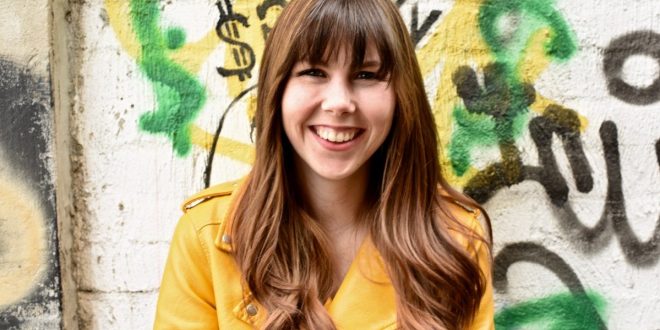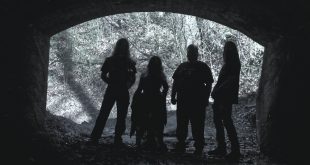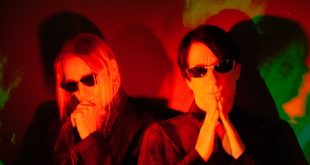Angela Mastrogiacomo is a writer, publicist, and public speaker based in Boston, Massachusetts. Mastrogiacomo initially catalyzed this skillset through her web publication, Infectious Magazine, which she established in 2009, and through her publicity firm, Muddy Paw PR, since 2013. Her specialties have grown to include DIY campaigning, artist pitching, community engagement, and above all, building and maintaining professional relationships.
I caught up with Angela to get a better idea of her journey, as well as touch upon how she implements her areas of expertise. As I’d soon learn, what started as a largely uncertain, spontaneous pursuit would ultimately blossom into a decade of solid music industry experience.
ME: Your formative years with Infectious Magazine began in 2009. How did that come about?
Angela: I like how you said my formative years, that’s exactly right. It was completely accidental (laughs)! I actually had no intention of being in the music industry, doing interviews, or anything like that.
When I was 20, I was at an Anberlin show, and their opener was this small, unsigned band out of Providence, Rhode Island called The Coming Weak. I’ve never heard of or seen them before, but they were just incredible. Their music was incredible, but beyond that, it was their stage presence. They were bouncing around up there, had the audience excited, and they all interacted with one another. I haven’t seen millions of shows at that point, but I’m sure you know the feeling when you’re watching a band that is super boring and doesn’t know how to be on stage. But seeing these guys, even though they had a small following, it was as if they were performing on a huge stage in front of thousands. Everything about that inspired me.
Then, I got this crazy idea that I just had to interview them and tell their story. This was back in 2009, so music blogs were only popping up here and there. I didn’t know what I was doing, but I wanted to start a blog in order to interview them. I had a video camera and we did a video interview. That was my first one, in March, outside, in the snow (laughs)! From there, I thought, “Why not interview more bands in order to get more of their stories?” That’s really how it all started.
ME: Were you able to translate a lot of what you learned into Muddy Paw PR, or was there a different skillset involved that you had to learn as you went on?
Angela: It was different in a lot of ways. Back when I graduated from college, I was coming off of different jobs. I started my own PR company because being a writer and blogger, I’ve worked with so many publicists and seen how they approach artist pitches and press releases. It was a natural transition and I’ve acquired a lot of skills because I knew what I enjoyed doing, and what did or didn’t work for a pitch. But that being said, there was so much more to it that I was unfamiliar with and had to learn, in terms of public relations as a whole, and running a business in general. For the first couple of years, there was a learning curve. I was very naive, and I’m thankful, in a way, because if I already knew the work, the experience wouldn’t be as exciting. I was able to focus more closely on how publicists approached their pitches, building those relationships from scratch, and wanting to learn more about the music industry as I went on. I think I’m much better equipped now than I have been these past five years because of that learning curve.
ME: Were you surprised how much you were actually able to implement early on, given those circumstances?
Angela: Yeah, and that really comes back to my being naive. I only took one PR course in college, and it wasn’t even that good (laughs)! On the other hand, because of what I had learned, I thought I’d just be able to start the company and hit the ground running. But on the flip side, I was mainly surprised by how much more there still was to learn.
ME: You’ve spoken at many events, such as South By Southwest, Indie Week, and Canadian Music Week. Over time, what have you noticed about your own speaking skills?
Angela: That’s a really good question because I’m normally a very shy person. I think I’ve gotten a lot better at speaking in public, and those first few years with Infectious really helped — pushing myself to talk to artists, and capturing their personalities on video. When going back and watching what I do in past interviews, I’d try to correct myself and think of ways to improve for next time, which was really helpful down the line.
I will say that I talk with my hands a lot — even as we’re talking right now. I know, it’s weird cause this is over the phone and you can’t see me, but I can’t think without doing it (laughs)! But having had all those experiences, it does help once you essentially force yourself into those uncomfortable situations talking to musicians, whether you mix up some words or stumble through what you want to say. It’s even helped when I’ve talked to clients, or other blogs, you know? But I have grown to love public speaking, and it’s definitely one of my favorite things. Even though I still get crazy nervous beforehand, it’s one of the best feelings in the world.
ME: One of your areas of expertise involves pitching. From both the artist and publicist sides, I’ve seen that they both tend to approach this the same way, which is making their emails sound really pitchy, and in-your-face. How do you establish a good balance of material to include in the email?
Angela: When you first email someone, you need to personalize it. You’re demonstrating that you’ve spent enough time investing in what that person is looking for. If you’re asking them to invest in you, you’d have to invest in them first.
The next thing you’d do is to keep it simple. Some parts that I look for, whether I’m receiving an artist pitch, or doing a pitch myself, is to make sure there’s not too much information, or in other words, just enough to really hook the person in. When you make the pitch, it’s all about “Who are you, what do you want (review or interview), and what’s the most interesting part of your story?” As long as you stick to that formula, it’s a good way to see if you’re fit for one another.
ME: I notice that there are not only bands who need to refine their ways of communication, but publicists, too. For example, if a publicist emails you saying, “I’m coming your way with one of the best bands, and they’re ready to change the world,” you’ll be equally discouraged as you’d be when getting a pitch from an artist.
Angela: That’s so true! And you also bring up a good point in terms of band communication. I’ll spend my time coordinating features for these artists, but if they’re waiting too long to get back to me, or we have to revise their interview a bunch of times, or they’re just not generally good at telling their story, or they’re not open to feedback on how to improve, those setbacks can really hinder a campaign. I can only imagine that it’s problematic when a band is doing their own PR because no one is there to instruct them on what they’re doing wrong, and how to make it more effective. I do encourage that bands do their own PR at first, just so they know what to look out for once they eventually hire a publicist.
You’re right though that there is a delicate balance. There’s nothing worse than a publicist who doesn’t do enough for their band, or they pitch to blogs that they have the greatest band in the world. It’s very subjective. They’re going to alienate a lot of people from listening to the music, and getting to know who these bands are.
ME: When you’re on the receiving end, what’s the kind of pitch you’d like to ideally open from another publicist?
Angela: I always just want the pitches to tell a good story or something about their band that really resonates. For me, I know that I wasn’t clicking on every pitch that came into my inbox. If their story resonates, that’s the first step that a band takes in establishing their brand. Then, we can get to the music.
ME: Fan engagement is another huge concept that applies that same aspect. After a band gets their fan base together, when would be the most sensible time to have a campaign around their release?
Angela: We typically start campaigns for albums or EPs eight weeks ahead of the release, and then we do a single or video release within a couple of weeks. First, we take time to set up the premiere, and then start the campaign when it comes out. I would use that as a rough guideline for bands doing their own PR. If you do a single, you set up the premiere and then start the campaign. For albums and EPs, you’d use those eight weeks to get a few singles out before the album releases. But there’s a bit of a method to it. You don’t necessarily want to wait until the release comes out and only then start building up those relationships with fans and press. As far as the nitty-gritty, it’s just important that you have a new release. If your album or single came out six months ago, in most cases, there’s not much more you can do with it. As much as you get excited for simply wanting to get your music out there, you have to have a plan, if you want to make it reach more than a few people.
ME: It all comes down to building those relationships. These days, how do you make sure these artists are productively getting out there?
Angela: Of course, we help these artists with PR campaigns, but we recognize that those can be expensive. They can run you a couple thousand dollars depending on what kind of campaign it is. So, if you have a full-length album coming out, let’s say, you can maybe do your own PR for the singles, and then work with someone for the album. Another thing we work on is social media engagement — helping an artist nail down their brand and build trust with their fans. If they’re confused on how to go about it initially, we also offer coaching — which is what we’ve been focusing on these past five years — to go over what a PR campaign would look like, and how to successfully implement it. Once we give them the tools, then they’d be able to apply all they’ve learned.
One thing I’m really excited about is that in the fall, I’m going to launch my first course. I recognize that not everyone has thousands of dollars to throw around, or they just want to do this themselves. My hope with this is that I’m able to reach more people, and at a much lower price point. What brings me fulfillment in life is being able to educate and help people. I’m glad that I’ve been able to do that and hope to continue. Every artist is unique and has different needs, so I try to accommodate several different options depending on where they are in their career.
ME: Ultimately, what can you take away from everything in your career that’s happened thus far?
Angela: One of the most important takeaways is to remind myself why I do this — to help people, but also to have fun. You start off excited, then have all these twists and turns, and feel really burnt out after a while. So, it’s important to constantly remind yourself of why you started in the first place and creating a path in life that adheres to those principles.
Another takeaway is that relationships in this industry are everything, whether they’re with fans, writers, publicists, or other people in the industry. You can be the most talented person in the world, but if you intentionally burn bridges with others, it won’t work out. On the other hand, if you take the time to find people you can naturally mesh and grow with together, it’s amazing, and the most powerful thing you can do for yourself.
ME: Lastly, is there anything you’d like to say to your ‘fans’?
Angela: I’m not sure if I have any fans (laughs), but it does mean a lot! The thing that gets me up in the morning is the validation that I’ve made a difference in someone’s life. It can be something small, like someone may reply to my Instagram post, or see this interview, and say, “Thanks for this, I’ve learned so much!” That kind of thing lights me up. I can live on that for days, if not, weeks. I feel really lucky that this turned out to be my career because it feels kind of crazy that it is. I’m just grateful, and I guess I would just say thank you!
Sign up for Angela’s free 4-part mini-training for tips on engaging and growing your audience, and learn the strategies that have gotten her clients placements on Alternative Press, Noisey, and spots on festivals like Warped Tour and SXSW:
Also, check out her new membership site (co-launched alongside musician/entrepreneur Steve Palfreyman), which creates a space for artists to unite and reach their maximum potential:
Angela Mastrogiacomo Socials:
 Music Existence Because of Music, We Exist
Music Existence Because of Music, We Exist




